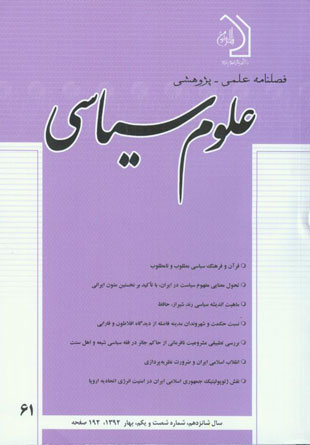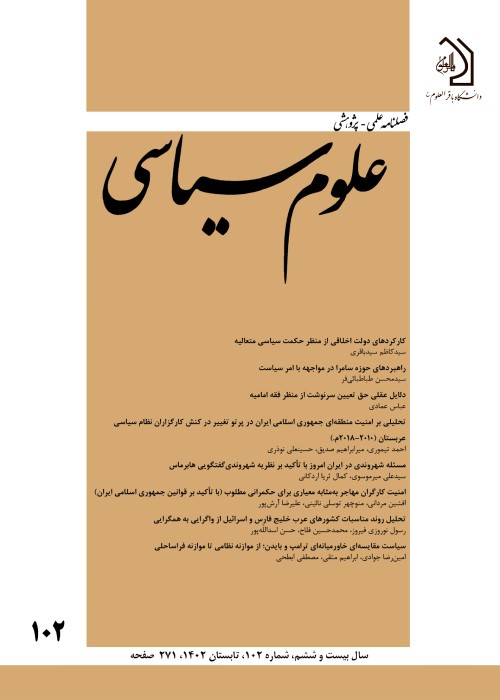فهرست مطالب

نشریه علوم سیاسی
سال شانزدهم شماره 1 (پیاپی 61، بهار 1392)
- 192 صفحه، بهای روی جلد: 50,000ريال
- تاریخ انتشار: 1392/02/18
- تعداد عناوین: 8
-
- مقالات
-
صفحه 173
-
Page 7Prior to the analysis of political culture in view of Holy Quran, it should be designed a pattern of analysis. In this regard, three indexes of each political-insightful, emotional and value-based culture have been identified. Afterward, it has been considered these three indexes for the two groups of rulers and followers. Next, the general political system, the political decisions, and the citizens in society have been considered for the political culture. Finally, the positive and negative dimensions of political culture of each case have been separated from one another and the combination of these factors has provided the pattern of analysis.After the extraction of the related verses in the political culture analysis in view of Holy Qur’an, three phases have been overtaken: initially, the favorable and unfavorable patterns have been introduced. In this regard, it has been discussed the favorability of government through the specific conditions extracted out of verses and its naturally corruption making on the basis of numerous verses.In the second phase, the favorable and unfavorable political culture of rulers has been exemplified. responsiveness, kindliness, proximity to the wise people, accepting consult, being bound to contracts are the elements of favorable political culture whereas harshness, proximity to flatterers, underestimating people, expecting adoration of them, exclusionism, and the violation of contract are the elements of unfavorable political culture.In the third phase, it has been noted to the followers’ favorable and unfavorable political culture. Reciprocal communal guardianship, obedience according to the book, and the tradition along with collective aware cooperation are the indexes of favorable political culture while obeying blasphemous people, two-faced people, liars, people of oath, risers, and leaders of tribes are the elements of unfavorable political culture.Keywords: political culture, Holy Quran, Favorable pattern, Ruler, Citizen
-
Page 39The present writing is to achieve the concept of politics and its conceptual alteration in the history of Iran. It is made an effort to study this concept in the earliest Iranian texts through a conceptual method. The first part is a prelude to evaluate the words of politics and sovereignty. In the second part being the main body of writing, it is investigated the concept of sovereignty concerning the word “khashathra” and its conceptual field in the first Iranian texts of Zoroastrian. khashathra is manifested through the focal meaning of authority, territory and political sovereignty with the three aspects of manifestations.“Khashathra vairiya” in the convergence with “vohumana” in the heavenly domain has represented the meaning of ideal sovereignty. In the universe, it is also appeared with the status of “hu” (fine) and “dosh” (bad). Fine sovereignty (hukhshathra) in the connection and in line with determined orderliness of Auramazda “asha” and bad sovereignty (doshkhashasra) gets its meaning in the fighting with it and through obeying lie, destruction and harshness (darug).In the end, the conceptual alteration of sovereignty from gahani kashathra to khashathra the inscriptions of hakhamanshi’s commands would the third and the final part of writing.Keywords: politics, sovereignty, khashasrah, khashatha, conceptual field, gahan
-
Page 69According to this writing, Hafez inspired by the pattern of “treaty writing”, is of political thought. The article has benefited from the strategy of content analysis in favor of the extraction of political concept of Divan e- Khajeh as well as the compilation of data.In the study of political thought, it is asked whether Hafez is traditional or nontraditional or what the mystery of his compliments from the rulers of that age is. The article has viewed to the intention hermeneutic, theoretical pattern of Skinner through a balanced view towards the text and the ground of political thought of a scholar.In this writing, three opponent theories are rejected. Hafez has taken advantage of dissimulation and if he has shown any fondness towards the owners of power, it has been due to preserving his life and position 0. Hafez has had an instrumental usage of this fondness, his main political view was not in favor of monarchy, and his ideal was towards seeking right and justice, 3. There exists a constantly positive and meaningful relationship between Hafez’s mystical alterations and his political thoughts.Keywords: Hafez, Political thought, Skinner, Intention hermeneutic, Content analysis, Treaty
-
Page 91The human with a social nature constantly seeks for happiness and perfection. He is in need of a favorite ground to reach his supreme goals. The society on the light of wisdom would be the best condition towards the advent of potential talents; accordingly, the human can achieve his highest humanistic perfections.Plato stated the issue of ideal city or utopia to actualize these very talents. After him, Farabi, the founder of Islamic philosophy, mentioned the idea of utopia in favor of the development of humanistic states through the sources of revelation and the instructions of Islam.In fact, all the concern of Plato and Farabi is the people’s achieving a real bliss reliant on the prevalence of wisdom among them.The present article clarifies the identity of utopia to the various levels of people of this ideal city in view of these two philosophers and then the function of wisdom according to the level of society. Finally it is made a comparison between the ideas of Plato and Farabi.Keywords: Wisdom, Utopia, Society, Rulers, Citizens, Plato, Farabi
-
Page 107A comparative approach towards the issues and the jurisprudential instructions in view of diverse religions can lead to the elucidation of the different and similar aspects along with the advent of the weak and strong points of each view. One of the significant issues being disagreed upon among the jurisprudential religions is the matter of civilly disobeying the tyrant ruler. The acceptance or rejection of this issue has a great impact on the political – social alterations of Islamic societies. According to the political thought of Shi’ah, it is essential to disobey the tyrant ruler. This issue has led to the development of movements as well as assertive actions against the internal dictatorship and tyrant rulers such as the initiation of Islamic Revolution in Shiite societies.On the contrary, in the Sunnite political jurisprudence, this disobedience is considered a forbidden and reproached matter. In spite of the existence of a variety of opposite ideas among the Sunnite jurisprudents, this idea is dominant due to the historical reasons.This interpretation is a hindrance towards the development of Revolution and the extended political fights against the internal dictatorship in Sunnite societies.This article is to study the issue of civil disobedience through a jurisprudential view together with a comparative approach.Keywords: Civil disobedience, Political jurisprudence, Uprising, Tyrant ruler, Jihad
-
Page 127During the modification of humanistic knowledge and universalism, Islamic revolution of Iran was a new change according to the humanistic, exalted as well as value-based foundations and it presented the exalted and humanistic values to human. Considering the universal threats, preservation and the survival of Islamic revolution and its values is considered a significant issue for the present society. In this regard, the main question of the present writing is connected to the way of protecting revolution and its values as well as tryout towards its advancement.The answer is that, this action is dependent on possessing a theoretical wisdom and supportive ideas relying on the value-based principles of Islamic revolution. Theorizing in this regard should be on the basis of the most fundamental values of Islamic revolution (Unitarianism, humanism, universalism, being in favor of ordinary people, idealism, perfect nature of human, vigilance and uprising in favor of God, sovereignty, self-esteem, fighting against injustice) to provide the ground for the perseverance and survival of Islamic revolution values as well as re-blossoming Islamic-Iranian civilization.Keywords: Islamic revolution of Iran, theorizing, values, Islamism, Being Iranian
-
Page 145Through a descriptive and analytical method and on the basis of oval theoretic framework, this research is to clarify the function and the geopolitical position of Islamic Republic of Iran in the immunity of energy, particularly the geopolitical potentials of energy of Iran as well as the present and the future potentials of the countries of European Union in favor of the supply and demand of energy. On account of the outcomes of this research, energy is considered as a geopolitical variable possessing a significant position in the plays over the power in the system of universe. Achieving energy sources for all of the hierarchical levels of power is of strategic importance. Accordingly, each of the performers of the universal system is seeking for an acceptable definition from the position of their energy in the world. Among this, Iran is of significant rank due to its location in the strategic oval center of energy of the world and having the third sources of unrefined oil as well as the second sources of natural gas of the world.European Union is one of the economical centers of importing energy. The internal products of union have been deeply decreased. This dependence on the importation of energy demands the Islamic Republic Iran’s taking appropriate strategies and supposing European Union as an appropriate market for the sale of oil and gas.Keywords: Geopolitical, Immunity of energy, European Union


